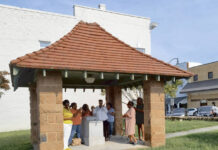CHARLOTTE – The Alzheimer’s Association, Western Carolina Chapter and the Alzheimer’s Association, Eastern North Carolina Chapter are launching a brand new educational program to offer tips for individuals managing the finances of those with a chronic illness who are under their care. The program will be offered regularly beginning with the inaugural event taking place on Tuesday, March 29.
“Money Management: A Caregiver’s Guide to Finances” will take place from 12 – 1 p.m. via webinar. Participants will learn tips for managing someone else’s finances, how to prepare for future care costs and the benefits of early planning.
This program, created in part by a grant from U.S. Administration for Community Living, Department of Health and Human Services, has been designed to offer guidance for caregivers of all individuals living with a chronic illness, but will specifically address financial needs related to Alzheimer’s and other forms of dementia.
“Creating a plan for the future in the early stage of a diagnosis of dementia can be empowering to the individual living with the disease and ensure their wishes are met,” Katherine L. Lambert, CEO of the Alzheimer’s Association, Western Carolina Chapter said. “This new program was created with the knowledge that the sooner financial plans are established, the better-prepared individuals living with the disease and their caregivers will be.”
While the inaugural program is being held via webinar, it will be offered in-person or virtually beginning in April. These programs will be open to the general public. There is no charge to participate, but registration is required. Attendees of virtual programs can attend via video/webinar or through a toll-free number. To sign up for the March 29 program, visit tinyurl.com/CaregiverFinances or call 1-800-272-3900. To access the list of public programs that is updated monthly, visit act.alz.org/ncmonthlyprograms. To request this program be offered for your local community in North Carolina, email infonc@alz.org or call (980) 498-7760.
The costs of health care and long-term care for individuals living with Alzheimer’s or other dementias are substantial, and dementia is one of the costliest conditions to society. In 2021, Alzheimer’s and other dementias were estimated to cost the nation $355 billion, including $239 billion in Medicare and Medicaid payments combined. Unless a treatment to slow, stop or prevent the disease is developed, in 2050, Alzheimer’s is projected to cost more than $1.1 trillion (in 2021 dollars). This dramatic rise includes more than three-fold increases both in government spending under Medicare and Medicaid and in out-of-pocket spending.
People living with Alzheimer’s or other dementias have twice as many hospital stays per year as other older people.
Medicare beneficiaries with Alzheimer’s or other dementias are more likely than those without dementia to have other chronic conditions, such as heart disease, diabetes and kidney disease.
Older people living with Alzheimer’s or other dementias have more skilled nursing facility stays and home health care visits per year than other older people.
People living with Alzheimer’s or other dementias make up a large proportion of all elderly people who receive adult day services and nursing home care.
Christine John-Fuller is with the Alzheimer’s Association.
To support the Anson Record call 704-994-5474 or visit https://ansonrecord.com/subscribe.




